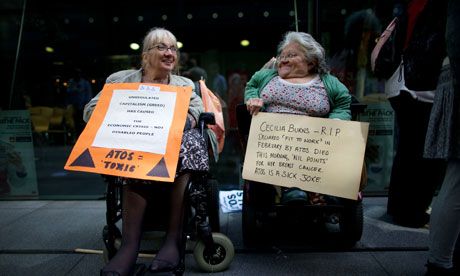
- Demonstrators outside Atos HQ in London last week. ParalympicsGB have denied that athletes took part in a silent protest against the company at the opening ceremony of the Paralympics. Photograph: Andrew Cowie/AFP/Getty Images
Thank you to The Guardian and Patrick Butler for acknowledging our work
~ Black Triangle Campaign
For a few hours, campaigners thought they had witnessed a silent protest by ParalympicsGB athletes against the Games sponsor, Atos, at last week’s opening ceremony. This, they hoped, was the Paralympics’ “Tommie Smith moment” a powerful gesture in the name of disability rights.
Twitter was briefly awash with speculation that some athletes hid their security pass lanyards bearing the Atos logo as they entered the stadium. Television pictures seemed to back up the rumours. ParalympicsGB, was adamant there was no protest: it was windy, and the lanyards had been tucked away to stop them rattling. But it was not wholly implausible that many of these elite athletes would consider such an extraordinary gesture. Several have made it clear they have robust views on disability rights and welfare reform, not least the planned cuts in vital disability benefits that enabled many of them to become Paralympians in the first place. These Games have turned out to be surprisingly political.
This is partly because many competitors are by definition much closer to everyday reality than some of their more cosseted sporting contemporaries. “As soon as that gold medal winner steps out of the Olympic Park, he or she is going to face the same problems – whether its access to public transport or being abused in the street – as any other disabled person,” points out Richard Hawkes, chief executive of disability charity Scope.
And while the sport remains the media’s paramount focus, the Games have triggered an unusual interest in the vagaries of disability living allowance (DLA) reform, the shortcomings of the work capability assessment (WCA), the difficulties of getting on a bus in a wheelchair, and the shameful increase in reported hate crime against disabled people.It seemed both startling and appropriate last week when former Paralympian Lady Tanni Grey-Thompson told viewers on the Ten O’Clock TV news that for all our enthusiasm for all things Paralympic, we shouldn’t forget that buses are still inaccessible for many disabled people, or that wheelchair users find themselves being spat at in the streets and abused as “scroungers.”
More of the media are also beginning to show curiosity about disability rights. There’s been coverage of protests, such as the Disabled People Against The Cuts demonstrations against Atos, and the stories of people who have suffered tragic injustices through the “fit for work” tests, painstakingly collected by campaigners such as Black Triangle.
“A year ago we were scrabbling about in vain trying to get the media to cover welfare reform issues, and now its completely different,” says Kaliya Franklin, blogger and disability rights activist. “I sense the public are waking up and realising that people they know are affected by these reforms, people they don’t regard as scroungers and undeserving.”
The Games have proven difficult for Atos, the global IT-to-health corporation, which is not only a ParalympicsGB sponsor, but operates the controversial work capability assessment tests for the government (and will manage the tests for replacement disability living allowance from 2013).
The company argues that it is merely delivering a welfare service that conforms to ministerial specifications.
However, it has become a lightning rod for disability rights protests, such as the demonstrations outside the Atos London HQ and elsewhere last Friday.
“Its not good for Atos, ” says PR consultant Mark Borkowski. “If people were not aware of Atos, they certainly are now. It is a brand under terrible pressure.”
guardian.co.uk © Guardian News & Media Limited 2010
Published via the Guardian News Feed plugin for WordPress.

Yes and a brand that hopefully people will think twice about supporting in the future. I hope this is the start of a lesson for this ignorant condem government, and when they are voted out of office, the end of ATOS in this country. No longer will they be allowed to used the Nuremburg excuse of only following orders. They are taking the millions and doing the damage, and for this they stand accused and are found guilty. Let us ensure the next government tear up their contract and boot them out of this nation, we do not need profiteers at the expense of suffering. We need a fairer and more equal society, and to do this we need to be tough with those who do not see things this way, ATOS do not, for if they did they would have no part in the horrors that they are carrying out under the auspices of the DWP.They stand condemned by those who know what they are doing and for their knowing and willing participation.
We are much MORE pressure than Atos, and we will NOT give up. We’ve got NOTHING to lose.
Hurrah! Now they wake?